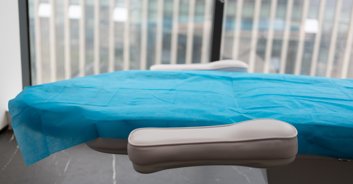The bigger, badder brother of piercings and tattoos, body modification is becoming increasingly popular in certain circles. Humans walk among us with horns, elf ears, split tongues and all manner of strange bumps under their skin. However, one artist’s procedures are pushing the boundaries even for a practise which itself is on the fringes of society.
Known as ‘Dr. Evil’, Brendan McCarthy has irreparably altered the appearance of hundreds of people. But body modifications such as ear and nipple removal put him in what was optimistically presumed a legal grey area. With no appropriate license to carry out surgery however, the 50-year-old is being pursued by the courts.
McCarthy, who owns Dr. Evil's Body Modification Emporium in Wolverhampton, UK, had a pivotal fact in his defence: he always had his clients’ consent. But while consent is important when it comes to injury through sport, activities, tattoos, piercings and medical surgery, body modification doesn’t comfortably fall into any one of those categories. Therefore, that he had his clients’ consent doesn’t mean he hasn’t committed an offence.

One such client is Nick Pinch, who went to Dr. Evil's Body Modification Emporium to have his nipples removed. Often, those who opt for this procedure do so to avoid any incongruous element of a whole-chest tattoo. However, Pinch had had extensive piercing and stretching in this area and was entirely satisfied with how he was treated: "[McCarthy] wanted to know why I wanted this procedure, he wanted to make sure I knew what I was doing, he took complete duty of care. I'm really happy with what I've had done."
The local council got involved when they were sent an image of the results of an ear removal which was performed in 2015. A decidedly drastic decision, the images seem truly gruesome to the uninitiated.
It seems those who were performing these procedures were somewhat blinkered when it comes to where they sit within the legal landscape. "Practitioners have assumed that extreme body modifications, as forms of body adornment, were lawful when consent was given,” states Dr Samantha Pegg, a lecturer in law at Nottingham Trent University and expert in this area. "Although the law has long accepted that tattooing and piercing are lawful activities there has not - until this case - been any consideration of other forms of body modification such as tongue splitting."

But McCarthy has strong support from the body modification community which sees this case as a clear infringement of civil liberties. Meanwhile, a petition set up by his partner has more than 14,000 signatures.
“Whether body modification is something you have strong feelings about or not,” the petition states, “this case touches upon the issue of supporting professionals, consent, peoples rights to feel comfortable and happy in their own bodies & discrimination.”
However, despite the backing of his peers, the court proceedings have, thus far, not gone his way. “We can see no good reason,” he was told in an initial hearing, “why body modification should be placed in a special category of exemption from the general rule that the consent of an individual to injury provides no defence.”

Judge Nawaz stated that body modification is completely different to tattoos and piercings, reasoning that there is "no proper analogy". He added: "What the defendant undertook for reward in this case was a series of medical procedures for no medical reason."
The Crown Prosecution Service (CPS) said that, even though there were also no relevant medical qualifications, a key failure of the parlour - on paper - is that it is not registered with the General Medical Council (GMC). "Surgical procedures must be carried out by properly trained, qualified and regulated surgeons or healthcare professionals," senior prosecutor Rhiannon Jones said.
"Under current laws, we are classed as effectively consenting abuse victims,” stated Body Art, born Matthew Whelan. "These are private procedures and agreements between me as the client and the business person.” Body Art, a keen proponent of body modification whose full name is King of Ink Land King Body Art The Extreme Ink-Ite, added: "But I do think there needs to be regulation. There are people in the industry that aren't protected."

McCarthy and others argue that the outcome of this case could send a great deal of body modification procedures underground - potentially creating greater harm to the end user.
Truly believing he was in the right, McCarthy spent an additional £40,000 ($51,000) to hire a new legal team and take his case to the supreme court. However, his appeal was denied. He eventually decided to plead guilty to grievous bodily harm but does so begrudgingly. "It's crushed me completely, I'm a shadow of my former self," said McCarty, who has recently become a father. "I don't feel I've done anything wrong." He will be sentenced on 21 March at Wolverhampton Crown Court.
While many people would agree that such extreme procedures are strange and unnecessary, this unusual legal situation highlights that, by extension of blame placed upon others, we don’t have sovereignty over our own bodies. Whether or not it’s a good thing that the state exerts this control is up for discussion.

.jpg_L3ypV8?tr=h-184)

